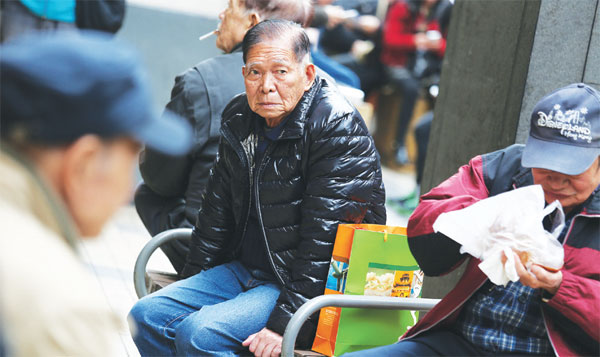Aging population poses serious health challenges
Updated: 2016-03-03 08:10
By Evelyn Yu in Hong Kong(HK Edition)
|
|||||||||
|
Some elderly men take a rest in Sham Shui Po. Hong Kong faces a mounting crisis of chronic disease among its rapidly aging population, experts say. Parker Zheng / China Daily |
Hong Kong is facing a mounting chronic disease crisis among its rapidly aging population.
Under Secretary for Food and Health Sophia Chan Siu-chee said Hong Kong should brace itself for a sharp increase in chronic diseases - as the city's aging population grows.
Longevity coupled with a low birth rate mean one in every three residents will be over 65 years old by 2040, according to Chinese University of Hong Kong (CUHK) Vice-Chancellor Joseph Sung Jao-yiu.
Sung said the demographic outlook posed a major healthcare challenge as well as raised questions about who will carry the burden of caring for an outsized elderly population suffering from chronic diseases.
Hong Kong women are some of the longest-living in the world, according to the Health Department, which found women lived for an average of 86.9 years in 2014 while men lived for 81.2 years.
Sophia Chan said the number of patients treated for chronic disease rose from 1.08 million in 2010 to 1.35 million in 2014, with obesity, high blood cholesterol and asthma being the major culprits.
She said the government was using a variety of solutions to cope with the challenge as well as investing heavily in preventative healthcare such as discouraging smoking, drinking and a sedentary lifestyle.
In spite of growing demands for healthcare, a steady decline in manpower is already affecting public hospitals' capacity to deal with patients with chronic diseases.
The potential to expand capacity in the private medical care sector was obvious, Chan said. He noted an imbalance in the ratio of public and private hospitals. While 42 public hospitals offered 27,440 beds in 2014, the 11 private hospitals only provided a capacity of 3,889.
The government has already taken steps to introduce more policies, such as plans for affordable medical insurance. This is in the hope of diverting an expected influx of patients with chronic diseases into the private sector.
An elderly healthcare voucher scheme provides elderly patients aged over 70 with vouchers valued at HK$2,000 a year. This can be used for private medical services - as one of many strategies to reduce waiting times at overcrowded public hospitals.
Hong Kong Council of Social Services' head of elderly service, Grace Chan Man-yee, said cooperation between government departments, the medical sector and community would be essential to meet coming challenges.
Chan said she hoped to see the introduction of more elderly services, such as having designated police officers to help identify and return wandering dementia patients.
evelyn@chinadailyhk.com
(HK Edition 03/03/2016 page8)
